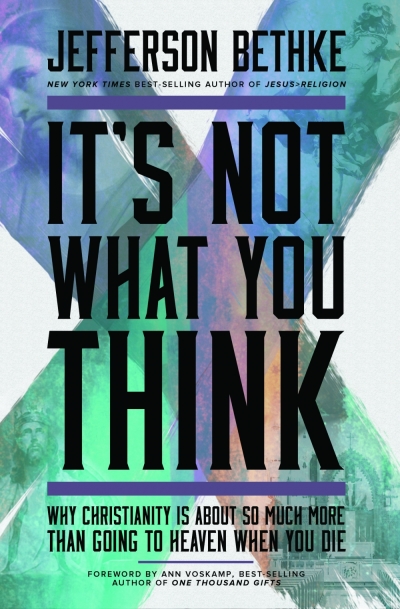Jefferson Bethke Aims to Re-Spark Christian Faith of Millennials by Revisiting Ancient Biblical Concepts

One of the cultural norms Bethke mentioned is the biblical Sabbath.
Modern Christians have written the Sabbath off as simply a day off from work where people go to church or watch football. But they're missing the mark, according to Bethke, who says that the Sabbath is a universal concept that transforms throughout Scripture and encompasses all aspects of life when looked at through the lens of history.
"Sabbath is about a day of rest, but it's also about a day of celebration. If you read the Old Testament, it's crazy! God wants [his people] to party! They have feasts everyday. And they're commanded [to]. It's a recovery of that, saying one day a week, what if we set [it] aside to really play, celebrate and invite God's presence into our life that week," he said.
The true Sabbath cuts against American culture, which often involves working around the clock and keeping busy, according to Bethke who believes correctly observing it is a genuinely human concept.
And by partying, Bethke isn't talking about the sex, drugs and rock 'n' roll. Instead, the author proposes that believers gather around a dinner table to eat, drink and share their weekly experiences. This fulfilling, yet overlooked, practice by the modern Church might even lessen one's desire to live on the edge.
"Eating well is a sacred spiritual gift. And so using that — rather than consuming to be greedy — as an opportunity to gather people. Getting people to tell you how their week was. What's their ups and their downs, and seeing how [you could pray for one another]. Seeing that as an actual communal activity is really something we lost that I think could turn into a beautiful spiritual rhythm," said Bethke.

Aside from recapturing the essence of sharing a meal with one another, Bethke also wants Christians to understand the Temple and the role it played in the lives of Jews and early Christians.
He further described the Temple as a place "where Heaven and Earth collide," and credits first century Jews for that definition.
"They [saw] Heaven as this kind of dimension that was ultimately in the beginning married to Earth, but because of sin they're kind of pulling apart, but not fully separated. And so that place where it stays connected, where Heaven and Earth are still touching, is the Temple," he told CP. "That's the place where God's and our presence collide."
Its close connection to Heaven is why there are regulations there that aren't anywhere else, according to Bethke.
He also defined the Temple as a shadow of Jesus Christ.
"Jesus comes — John 1:13 says the Word became flesh and dwelt among us. John's doing a play on words there where the word dwell in Greek is literally tabernacle. So he's saying, Jesus is temple-ing among us. That's the claim you get for the rest of the New Testament. The Temple building was a shadow, now Jesus is ultimately that place where Heaven and Earth collide," said Bethke.
"And Jesus is going out and actually taking Heaven into Earth and continually being on the offensive with creating those little sacred pockets of Heaven," he added. "And that's our job, as disciples, is to carry on that mission of taking Heaven and pulling it down as the place of God reigning and ruling onto Earth."
Jesus' mission ensured that believers received the Holy Spirit, which would now dwell inside each and every one of them, making them what Bethke described as "little walking temples." Because of this, believers now live in an age where Heaven and Earth collide inside every Christian.
"We become little walking temples, which I think makes us have a lot more responsibility, but not in a condemning way. This is really cool that this is our mission. To be that place where Heaven and Earth collide, and go show that to the places where Heaven is not there," he said. "Places where there's evil."
It's Not What You Think: Why Christianity Is About So Much More Than Going to Heaven When You Die is available on amazon.com and Bethke's official website.




























